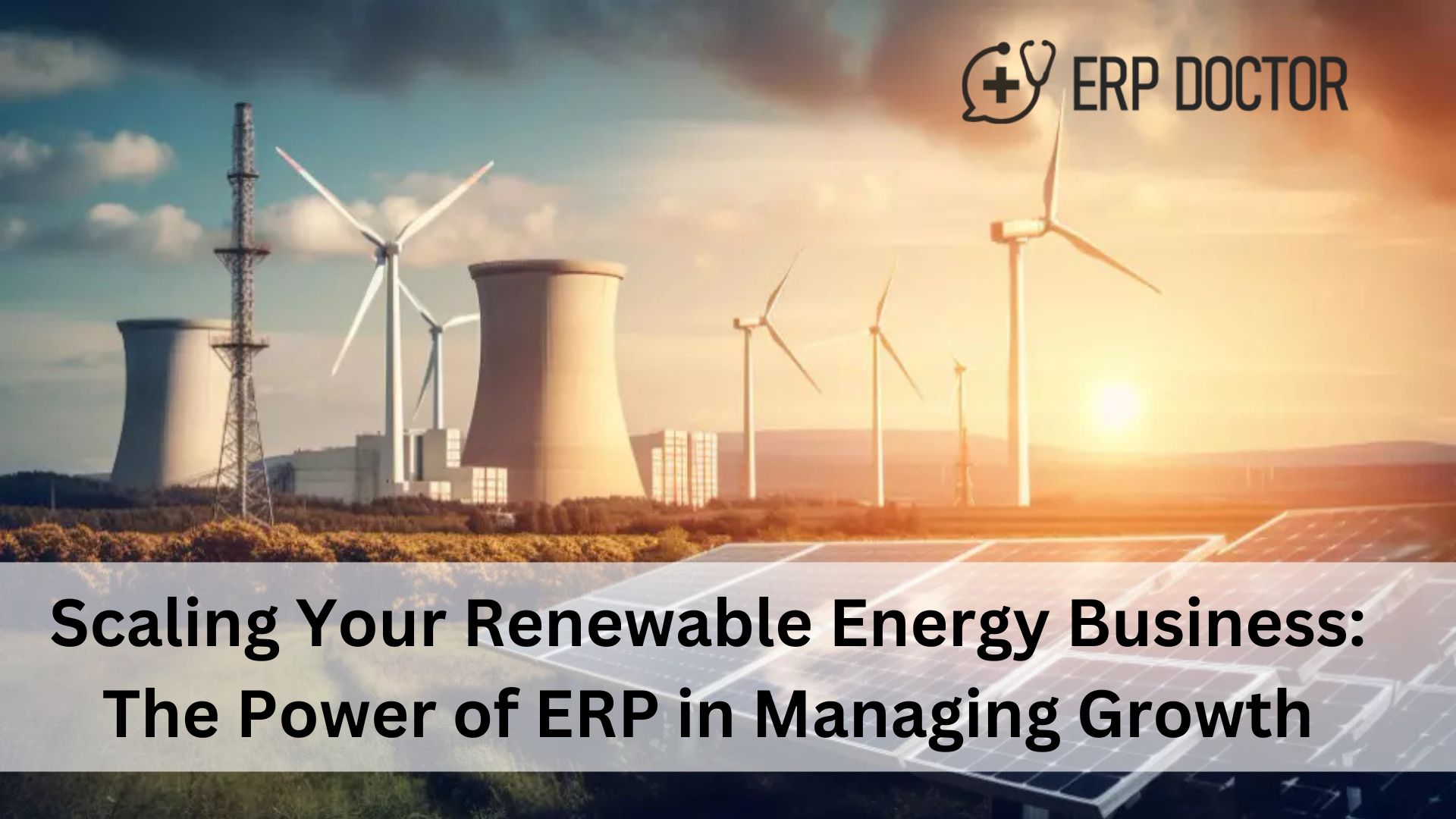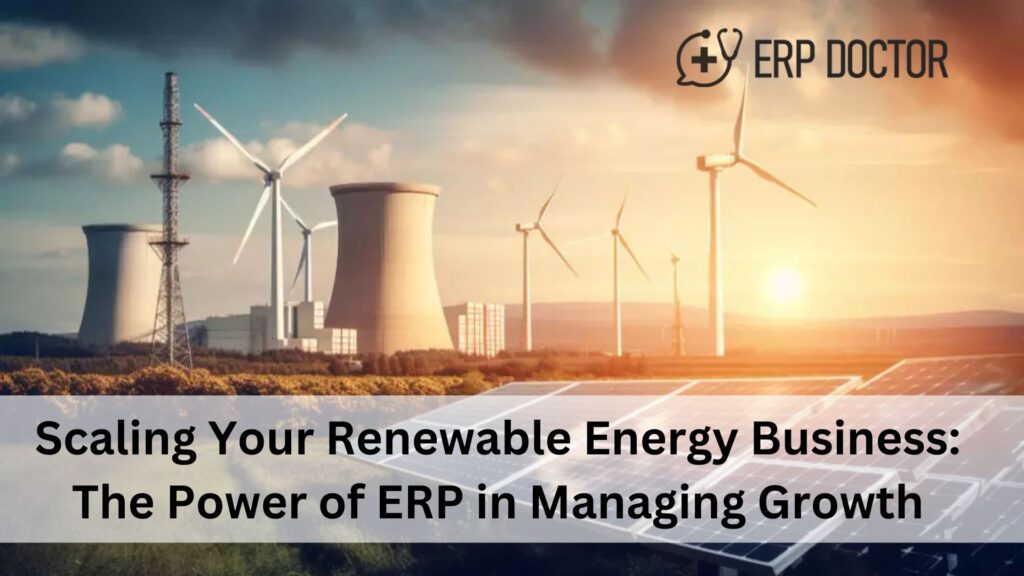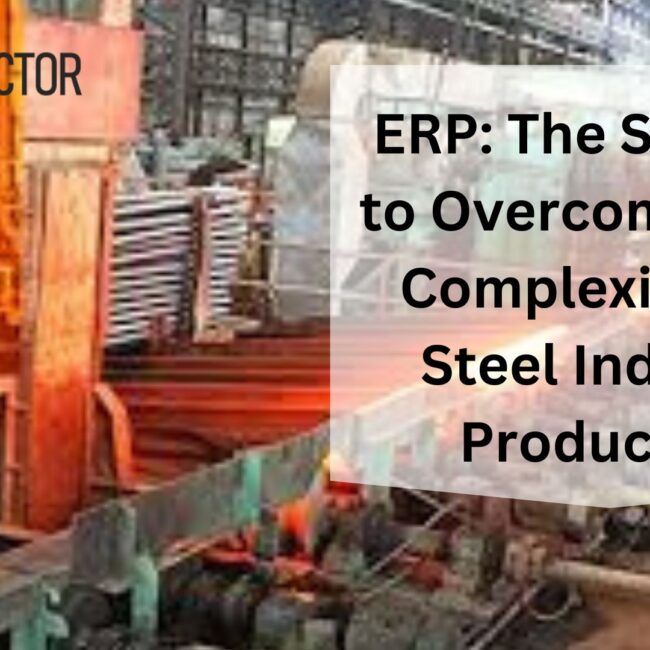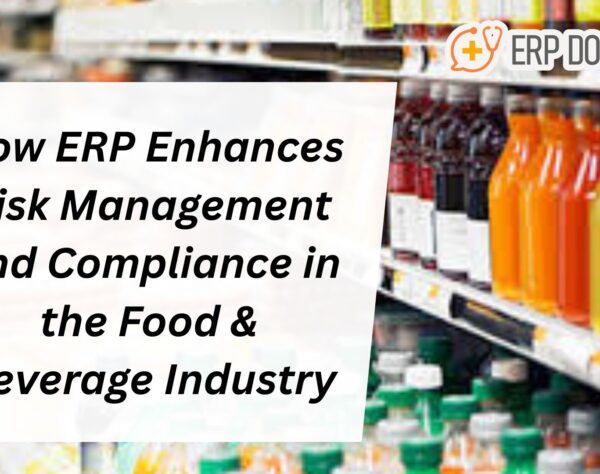
Scaling Your Renewable Energy Business: The Power of ERP in Managing Growth

Harnessing ERP to Overcome Challenges in Renewable Energy Sector
The renewable energy sector is undergoing rapid transformation, with businesses striving to manage complexity, increase efficiency, and drive growth. From solar power to wind energy and beyond, the industry faces unique challenges that require specialized solutions. For companies in this sector, ERP has emerged as an essential tool to streamline operations, manage resources effectively, and ensure regulatory compliance. In this blog post, we will explore how ERP for Renewable Energy Industry is helping companies overcome these challenges, optimize processes, and position themselves for success in a rapidly evolving market.
What is ERP?
ERP is an integrated enterprise resource planning (ERP) software solution designed for small and medium-sized enterprises (SMEs). It provides a comprehensive set of tools for managing various business functions, including finance, sales, procurement, inventory, operations, and customer relationship management (CRM). By integrating all business processes into one platform, ERP allows organizations to gain real-time insights, automate workflows, and make data-driven decisions.
For industries like renewable energy, which involve complex operations and extensive regulatory compliance, ERP offers customized solutions to handle sector-specific challenges.
Why Choose ERP for Renewable Energy Industry?
The renewable energy industry is marked by high capital expenditure, long project cycles, regulatory oversight, and a need for precise reporting. Whether it’s managing energy generation assets, tracking maintenance schedules, or handling government incentives, businesses in this sector need an ERP system that can accommodate their unique requirements.
1. Real-Time Data and Analytics for Better Decision-Making
One of the main advantages of implementing ERP software for Renewable Energy Industry is its ability to provide real-time data and insights into business performance. Renewable energy companies deal with large-scale projects and multiple stakeholders. SAP solutions help streamline reporting, track key performance indicators (KPIs), and forecast demand, making it easier to respond to market changes.
With ERP for Renewable Energy Industry, companies can:
- Monitor energy production levels in real-time
- Track equipment usage and maintenance schedules
- Analyze project performance and costs
- Measure regulatory compliance and incentives
- Generate financial reports with full transparency
By having access to real-time information, organizations in the renewable energy sector can make proactive, informed decisions that enhance efficiency and profitability.
2. Streamlined Operations and Automation
Renewable energy businesses often struggle with managing multiple projects, teams, and suppliers across different locations. ERP helps streamline these operations by providing a single platform to manage all aspects of the business. From procurement and inventory management to finance and sales, ERP solutions automate routine tasks, reducing the risk of errors and enhancing overall productivity.
For instance, ERP Implementation for Renewable Energy Industry allows businesses to automate:
- Procurement and supply chain management
- Equipment tracking and maintenance schedules
- Invoicing and billing processes
- Regulatory reporting and compliance documentation
By automating these functions, businesses can focus on strategic initiatives like expanding their project portfolio or exploring new energy generation technologies.
3. Integrated Financial Management
Financial management is critical in the renewable energy industry, where projects often involve significant upfront capital investments and long-term financing arrangements. Managing cash flow, project costs, and financial reporting can become overwhelming without the right tools. ERP software for Renewable Energy Industry offers a robust financial management module that helps businesses track and manage costs, revenues, and profitability with ease.
Key features of ERP for Renewable Energy Industry in financial management include:
- Real-time tracking of project costs, revenues, and margins
- Detailed reporting on government incentives and subsidies
- Comprehensive cash flow management tools
- Automated billing and invoicing for energy contracts
- Integration with external financial systems and banks for seamless transactions
By streamlining financial operations, renewable energy companies can ensure that projects remain on budget and on schedule, maximizing return on investment (ROI).
4. Enhanced Supply Chain and Inventory Management
In the renewable energy industry, managing the supply chain is a complex process due to the diverse range of materials and components required for energy production. Whether it’s solar panels, wind turbines, or energy storage systems, businesses need to ensure that the right parts are available at the right time to avoid project delays.
With ERP Implementation for Renewable Energy Industry, companies can optimize their supply chain and inventory management processes. Features like real-time inventory tracking, automated procurement, and supplier management help businesses ensure that materials and equipment are sourced efficiently and cost-effectively.
The key benefits of SAP solutions for inventory and supply chain management include:
- Improved tracking of inventory levels and materials
- Automated procurement processes to avoid stockouts or overstocking
- Seamless integration with suppliers and third-party vendors
- Real-time data on project requirements and procurement needs
- Compliance with environmental standards for sourcing and waste management
This level of visibility and control helps renewable energy businesses reduce operational costs, improve efficiency, and avoid delays caused by supply chain disruptions.
5. Compliance with Industry Regulations and Standards
The renewable energy industry is highly regulated, with numerous national and international standards that companies must adhere to. Whether it’s environmental impact assessments, safety regulations, or financial audits, compliance is critical to avoid penalties and ensure continued operations.
ERP software for Renewable Energy Industry comes equipped with features that help companies stay compliant with these regulations. ERP offers:
- Customizable compliance reporting tools
- Integration with regulatory agencies for data submission
- Tracking of energy production and emissions for sustainability reports
- Tools to manage certifications and licenses for renewable energy projects
By using ERP solutions for Renewable Energy Industry, companies can ensure they remain compliant with local and international standards, while also improving sustainability reporting and environmental transparency.
6. Scalability and Future-Proofing
As the renewable energy market continues to grow, businesses will need scalable solutions that can grow with them. ERP for Renewable Energy Industry is designed with scalability in mind, allowing companies to add new modules, functionality, or users as their operations expand. Whether you’re scaling to manage new projects, entering new markets, or integrating new technologies, ERP provides the flexibility to adapt and grow alongside your business.
7. Improved Customer Relationship Management (CRM)
Customer relationships are central to any business, and renewable energy companies are no exception. Managing customer contracts, service agreements, and project timelines can be challenging, especially when dealing with multiple stakeholders. ERP Implementation for Renewable Energy Industry includes a powerful customer relationship management (CRM) module that helps businesses nurture client relationships, track sales leads, and monitor contract performance.
Key CRM features include:
- Managing energy contracts and agreements
- Automating customer service and support requests
- Analyzing customer trends and feedback
- Providing personalized client communications and offers
With ERP for Renewable Energy Industry, businesses can improve customer satisfaction, increase retention, and build long-lasting relationships with clients, investors, and partners.
Why ERP is a Game-Changer for the Renewable Energy Sector
The renewable energy industry is complex, fast-paced, and highly competitive. To succeed in this environment, businesses must leverage advanced technology solutions that can streamline operations, ensure compliance, and enhance decision-making. ERP for Renewable Energy Industry offers a comprehensive, integrated solution to address the unique challenges of this sector. From real-time data analytics and financial management to supply chain optimization and regulatory compliance, ERP helps businesses in the renewable energy industry stay ahead of the curve.
By implementing ERP for Renewable Energy Industry, companies can unlock greater efficiency, lower operational costs, and position themselves for growth in a sustainable and profitable way.
Whether you’re managing large-scale energy projects or handling daily operations, ERP solutions for Renewable Energy Industry provide the tools you need to succeed. Explore the power of ERP today and transform your renewable energy business for the future.
Visit ERP Doctor for Expert Solutions and Support
Want to speak to an expert? Fill in the form below, and we will be in touch with you shortly!







